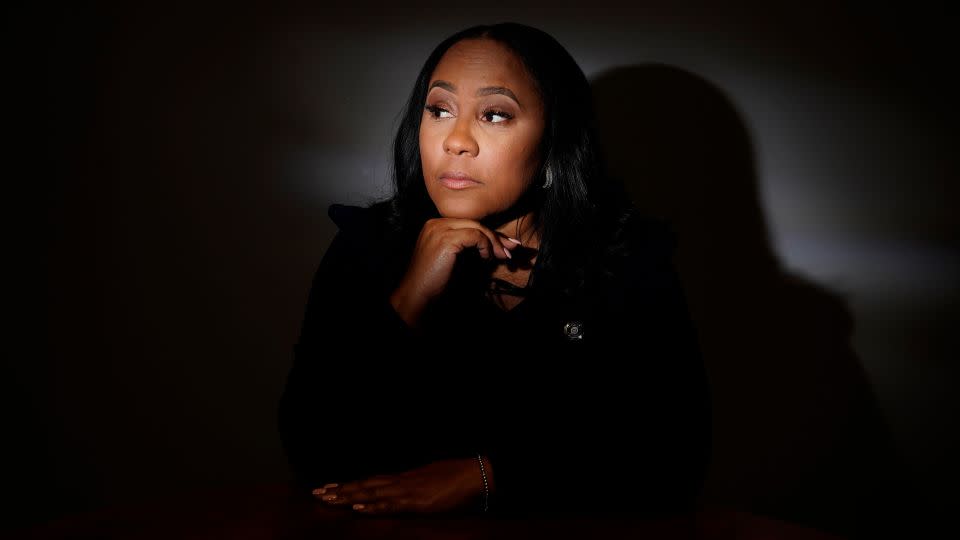Opinion: A new and dangerous attack on democracy in Georgia
- Oops!Something went wrong.Please try again later.
Editor’s note: Rachel Marshall is the executive director of the Institute for Innovation in Prosecution at John Jay College in New York City. The opinions expressed in this commentary are her own. Read more opinion at CNN.
A new threat to our democracy has emerged in Georgia — and I’m not talking about the false claims of 2020 election fraud. A new law, signed by Gov. Brian Kemp, creates a commission to restrict the independence of community-elected prosecutors — or remove them from office altogether.

Fortunately, those who care about protecting democracy are fighting back. On Wednesday, four Georgia prosecutors, led by DeKalb County District Attorney Sherry Boston and represented by the Public Rights Project, sued the state to contest the law’s interference with the separation of powers and its overriding of local communities’ rights to choose their own prosecutors.
The prosecutors are also defending their First Amendment right to speak openly about their office’s priorities — for instance, do they use their limited resources to prosecute abortions or violent crimes such as sexual violence, robbery or homicide?
Senate Bill 92 creates a commission with the power to remove prosecutors based on their use of this constitutionally protected discretion. It invites complaints against prosecutors for their so-called abandonment of duties, including when they decline to prosecute provable cases, or when they reject the prosecution of certain categories of crime. A prosecutor removed by the commission cannot serve again for 10 years.
As the executive director of the Institute for Innovation in Prosecution at John Jay College, a national prosecutorial reform center, I am deeply concerned about the harms SB 92 will inflict on prosecutors and the communities they serve. The law not only threatens the indispensable role of prosecutorial discretion in our legal system but is also a bad faith attempt to undermine prosecutors who advance reform — and disempower communities that elected them.
SB 92 did not emerge from a simple misunderstanding of the role of prosecutors. Instead, the law takes aim at reform-minded prosecutors as part of a growing national effort to constrain their independence.
One target may be Fulton County District Attorney Fani Willis, who soon is expected to announce charges in her 2020 election interference investigation and whom former President Donald Trump has tried to disqualify.

District Attorney Deborah Gonzalez of Athens-Clarke and Oconee counties has faced near-constant attacks for decisions — such as declining to prosecute marijuana possession or truancy cases — despite being elected for her reform approach. The governor tried to cancel her election, leading her to sue — and win. Kemp has now moved on to new approaches.
Indeed, Kemp made no secret of SB 92’s legislative intent. In signing the bill in May, Kemp said, “I won’t stand idly by [as law enforcement faces] resistance from rogue or incompetent prosecutors who refuse to uphold the law.”
Playing into pervasive false narratives around reform prosecutors, Kemp asserted the commission “will help hold prosecutors driven by out-of-touch politics [rather] than commitment to their responsibilities accountable and make our communities safer.”
This is political hogwash. Data establishes that prosecutors’ reform-minded approaches advance public safety. Indeed, one study showed that decisions by prosecutors not to file low-level categories of crime actually reduce recidivism. Thoughtful, data-driven reform drives public safety — but some politicians use fearmongering around reform to advance their own political agendas.
It’s worth noting that there have been no similar attacks on prosecutorial discretion when prosecutors use it to perpetuate mass incarceration, criminalize poverty or decline to prosecute police officers for excessive use of force. This law has only one target: reform-minded prosecutors.
Georgia’s law does not exist in a vacuum: In response to a growing wave of reform-minded prosecutors, Georgia is just one of several states attempting to disempower local prosecutors and limit their discretion.
It is no accident that these attacks come in the wake of the Dobbs v. Jackson Women’s Health Organization decision allowing states to criminalize abortion. Georgia now prohibits abortion after six weeks of pregnancy; SB 92, among other issues, takes aim at prosecutors who prioritize the safety of pregnant people by deciding not to pursue cases under that statute.
Other states have taken a more direct approach. Florida Gov. Ron DeSantis suspended Hillsborough County State Attorney Andrew Warren following that prosecutor’s promise to decline prosecuting abortion-related cases.
Forcing prosecutors to abandon discretion also fundamentally misconstrues their role; SB 92 depicts prosecutors as robots who must file every charge possible — a challenge considering the enormity of charges listed in penal codes. Such a view runs counter to our legal system’s design, which grants prosecutors discretion at every stage.
Prosecutors decide when to file charges, what charges to file and what outcomes to pursue. No prosecutor in history can, has or should prosecute every case possible. For example, Towaliga Judicial Circuit District Attorney Jonathan Adams issued a memorandum explaining that he would not prosecute adultery, a crime that remains on Georgia’s books. SB 92 deems this common-sense policy as possible grounds for discipline and removal.
Prosecutors represent “the people” — local communities — and are elected precisely to decide how to allocate limited resources. Communities deserve to have prosecutors who are free to be transparent about their priorities. Silencing or removing prosecutors and candidates undermines the democratic process.
SB 92’s limits on discretion are also impractical. Forcing prosecutors to file every case would not only advance unjust prosecutions but would also clog courts with cases that don’t belong in the legal system at all. Courts are already facing enormous backlogs — and victims and defendants alike will suffer from further delays.
Finally, reform-minded prosecutors seek to address racial bias; targeting them overrides the will of communities of color, who are already disproportionately harmed by the criminal justice system.
These legislative restrictions on prosecutorial discretion follow a rise in the number of elected reform-minded prosecutors — including more prosecutors of color — particularly in communities of color. It is no coincidence SB 92 comes in the wake of this changing tide.
It is hard to overstate the potential damage of SB 92. The rights of local communities — and locally elected prosecutors to advocate for them — cannot be forfeited. Prosecutors should not be mere puppets of the state. If we care about democracy, and if we value fairness in our legal system, we must stop these bad faith attacks.
After all, just as in 2020, the fight to preserve democracy in Georgia is really a fight for our nation.
For more CNN news and newsletters create an account at CNN.com

